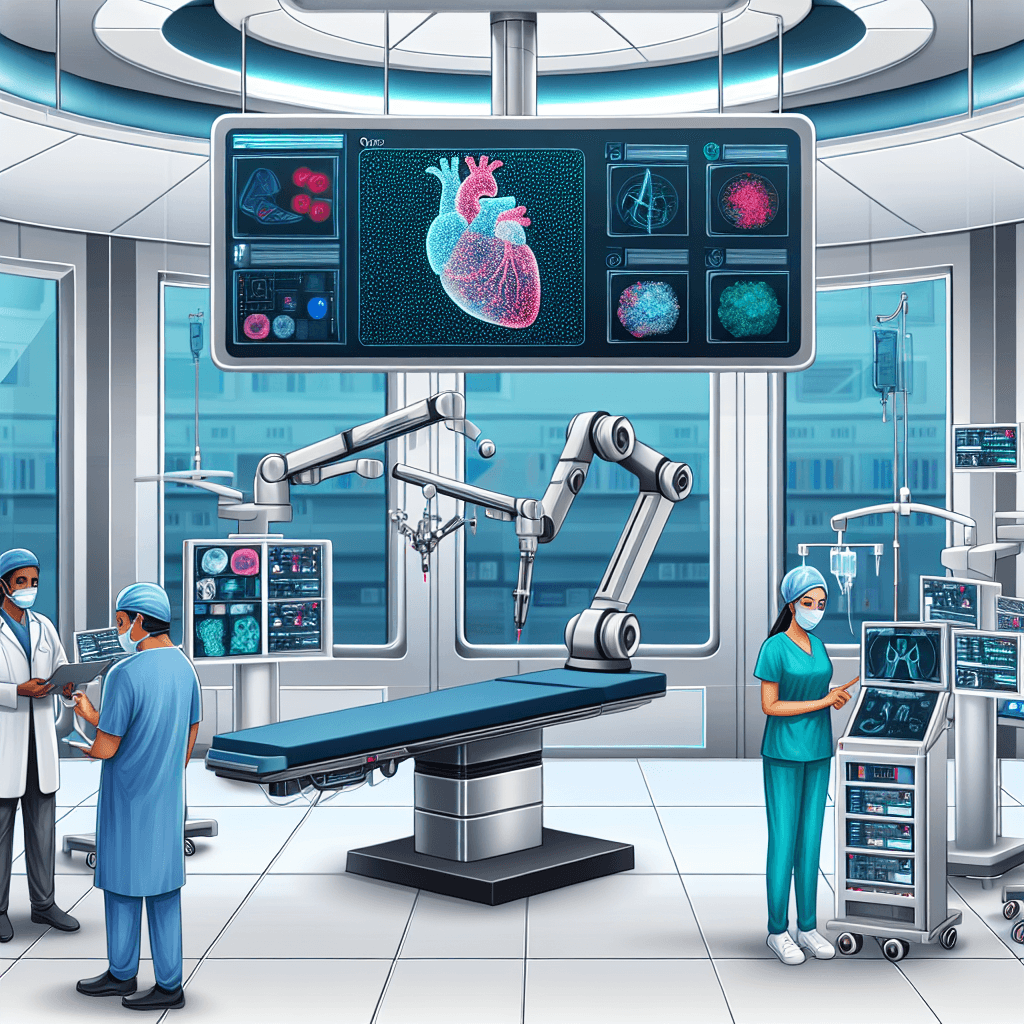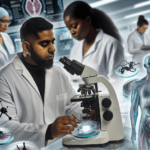Discover how AI is revolutionizing the medical device industry by enhancing capabilities such as accuracy, efficiency, and patient outcomes.
The Role of AI in Enhancing Medical Device Capabilities

Table of Contents
- Introduction
- The Impact of AI on Medical Device Design and Functionality
- How AI is Revolutionizing Medical Device Manufacturing Processes
- The Role of AI in Improving Accuracy and Efficiency of Medical Device Testing
- Exploring the Potential of AI in Enhancing Medical Device Diagnosis and Treatment
- Q&A
- Conclusion
“Empowering healthcare with intelligent technology: The limitless potential of AI in medical devices.”
Introduction
Artificial intelligence (AI) has become an increasingly important tool in the healthcare industry, particularly in the development and enhancement of medical devices. With its ability to analyze vast amounts of data and make predictions and decisions based on that data, AI has the potential to greatly improve the capabilities of medical devices and revolutionize the way healthcare is delivered. In this article, we will explore the role of AI in enhancing medical device capabilities and the potential impact it can have on patient care.
The Impact of AI on Medical Device Design and Functionality
The use of artificial intelligence (AI) has been rapidly expanding in various industries, and the medical field is no exception. In recent years, AI has been integrated into medical devices, enhancing their capabilities and revolutionizing the way healthcare is delivered. This article will delve into the impact of AI on medical device design and functionality, highlighting the benefits and challenges of this emerging technology.
One of the main advantages of incorporating AI into medical devices is the ability to analyze vast amounts of data in a fraction of the time it would take a human. This allows for more accurate and efficient diagnosis and treatment. For example, AI-powered imaging devices can quickly analyze medical images and detect abnormalities that may be missed by the human eye. This not only saves time but also reduces the risk of human error.
Moreover, AI can assist in predicting and preventing potential health issues. By continuously monitoring patient data, AI algorithms can identify patterns and alert healthcare providers of any potential risks. This proactive approach can help prevent diseases and improve patient outcomes. Additionally, AI can assist in creating personalized treatment plans based on a patient’s unique medical history and genetic makeup, leading to more effective and targeted treatments.
Another significant impact of AI on medical device design is the improvement of device functionality. With the help of AI, medical devices can now perform complex tasks that were previously only possible with human intervention. For instance, AI-powered surgical robots can perform delicate surgeries with precision and accuracy, reducing the risk of human error and improving patient outcomes. This technology also allows for remote surgeries, where a surgeon can operate on a patient from a different location, making healthcare more accessible to remote and underserved areas.
Furthermore, AI can enhance the user experience of medical devices. By analyzing user data, AI algorithms can learn and adapt to user preferences, making the devices more intuitive and user-friendly. This is especially beneficial for elderly or disabled patients who may have difficulty operating traditional medical devices. With AI, these devices can be customized to meet the specific needs of each patient, improving their overall experience and satisfaction.
However, with all its benefits, the integration of AI into medical devices also presents some challenges. One of the main concerns is the potential for AI to make mistakes or malfunction, leading to incorrect diagnoses or treatments. This is why it is crucial to thoroughly test and validate AI algorithms before implementing them in medical devices. Additionally, there is a need for strict regulations and guidelines to ensure the safety and effectiveness of AI-powered medical devices.
Moreover, the use of AI in medical devices raises ethical concerns. For instance, who is responsible if an AI-powered device makes a mistake? Is it the manufacturer, the healthcare provider, or the AI algorithm itself? These questions need to be addressed to ensure accountability and transparency in the use of AI in healthcare.
In conclusion, the integration of AI into medical devices has had a significant impact on their design and functionality. From improving diagnosis and treatment to enhancing user experience, AI has the potential to revolutionize the healthcare industry. However, it is crucial to address the challenges and ethical concerns associated with this technology to ensure its safe and effective use. With proper regulations and guidelines in place, AI can continue to enhance medical device capabilities and ultimately improve patient outcomes.
How AI is Revolutionizing Medical Device Manufacturing Processes

The medical device industry has been rapidly evolving in recent years, thanks to advancements in technology. One of the most significant developments in this field is the integration of artificial intelligence (AI) into medical devices. AI has the potential to revolutionize the manufacturing processes of medical devices, making them more efficient, accurate, and reliable.
AI refers to the simulation of human intelligence processes by machines, including learning, reasoning, and self-correction. In the medical device industry, AI is being used to enhance the capabilities of devices, making them smarter and more intuitive. This technology has the potential to transform the way medical devices are manufactured, from design to production and quality control.
One of the primary ways AI is revolutionizing medical device manufacturing processes is through the use of machine learning algorithms. These algorithms can analyze vast amounts of data and identify patterns and trends that humans may not be able to detect. This allows for more accurate and efficient design and development of medical devices.
In the past, medical device manufacturers relied on trial and error methods to design and develop new devices. This process was time-consuming and often resulted in costly mistakes. With AI, manufacturers can use data-driven insights to create more effective and reliable devices. This not only saves time and resources but also improves the overall quality of the devices.
Another way AI is enhancing medical device capabilities is through predictive maintenance. Medical devices, like any other machinery, require regular maintenance to ensure they are functioning correctly. However, traditional maintenance schedules are often based on a one-size-fits-all approach, which may not be the most efficient or cost-effective.
With AI, medical devices can be equipped with sensors that collect real-time data on their performance. This data is then analyzed by AI algorithms, which can predict when a device is likely to fail or require maintenance. This allows for more targeted and timely maintenance, reducing downtime and improving the overall efficiency of the manufacturing process.
AI is also being used to improve the quality control of medical devices. In the past, quality control was primarily done manually, which was time-consuming and prone to human error. With AI, manufacturers can use computer vision and image recognition technology to inspect devices for defects and ensure they meet quality standards.
This technology can detect even the smallest defects that may be missed by human inspectors, ensuring that only high-quality devices are released to the market. This not only improves patient safety but also reduces the risk of costly recalls for manufacturers.
Furthermore, AI is also being used to optimize the supply chain for medical devices. By analyzing data on demand, inventory levels, and production capacity, AI algorithms can help manufacturers make more accurate predictions and decisions regarding the production and distribution of medical devices. This can help reduce waste, improve efficiency, and ultimately lower costs for both manufacturers and consumers.
In conclusion, AI is playing a crucial role in enhancing the capabilities of medical devices and revolutionizing the manufacturing processes in the medical device industry. From design and development to production, quality control, and supply chain management, AI is making medical devices smarter, more efficient, and more reliable. As this technology continues to advance, we can expect to see even more significant improvements in the quality and effectiveness of medical devices, ultimately benefiting patients and healthcare providers alike.
The Role of AI in Improving Accuracy and Efficiency of Medical Device Testing
The use of artificial intelligence (AI) has been rapidly expanding in various industries, and the medical field is no exception. In recent years, AI has been playing a crucial role in enhancing the capabilities of medical devices, particularly in the area of testing. With the increasing demand for accuracy and efficiency in medical device testing, AI has emerged as a valuable tool in improving the overall quality and reliability of these devices.
One of the primary benefits of using AI in medical device testing is its ability to analyze large amounts of data quickly and accurately. Traditional testing methods often rely on human operators to manually analyze data, which can be time-consuming and prone to errors. With AI, data can be processed and analyzed in a fraction of the time, significantly reducing the testing time and improving efficiency.
Moreover, AI can also identify patterns and trends in the data that may not be apparent to human operators. This allows for a more comprehensive analysis of the device’s performance, leading to more accurate results. In addition, AI can continuously learn and adapt, making it an invaluable tool in detecting any anomalies or deviations in the device’s performance.
Another significant advantage of using AI in medical device testing is its ability to simulate real-world scenarios. This is particularly useful in testing devices that are designed to be used in complex and dynamic environments, such as surgical procedures. By using AI, these devices can be tested in a virtual environment that mimics real-life conditions, providing a more accurate assessment of their performance.
Furthermore, AI can also assist in identifying potential safety issues with medical devices. With its ability to analyze vast amounts of data, AI can detect any potential risks or hazards associated with a device’s design or functionality. This allows for early detection and mitigation of any safety concerns, ensuring that the device meets the necessary safety standards before being released to the market.
In addition to improving accuracy and efficiency, AI can also reduce the cost of medical device testing. Traditional testing methods often require a significant amount of resources, including time, manpower, and equipment. By automating the testing process, AI can significantly reduce the need for human operators and expensive equipment, resulting in cost savings for manufacturers.
Moreover, AI can also assist in streamlining the regulatory approval process for medical devices. With its ability to analyze and interpret data accurately, AI can provide a more comprehensive and detailed report on the device’s performance. This can help regulatory bodies make informed decisions about the device’s safety and effectiveness, leading to a faster and more efficient approval process.
However, the use of AI in medical device testing does not come without challenges. One of the main concerns is the lack of transparency in AI algorithms. As AI continues to learn and adapt, it can be challenging to understand how it arrives at its conclusions. This can be a significant issue in the medical field, where the decisions made by AI can have a direct impact on patient health and safety.
To address this concern, regulatory bodies are working towards developing guidelines and standards for the use of AI in medical devices. This includes ensuring transparency and accountability in AI algorithms and establishing a framework for the validation and verification of AI-based medical devices.
In conclusion, the role of AI in enhancing the capabilities of medical devices, particularly in testing, cannot be overstated. With its ability to analyze large amounts of data quickly and accurately, simulate real-world scenarios, and identify potential safety issues, AI has become an invaluable tool in improving the accuracy and efficiency of medical device testing. While there are still challenges to overcome, the potential benefits of using AI in this field are undeniable, and it is expected to continue playing a significant role in the future of medical device development and testing.
Exploring the Potential of AI in Enhancing Medical Device Diagnosis and Treatment
The use of artificial intelligence (AI) has been rapidly expanding in various industries, and the field of healthcare is no exception. In recent years, there has been a growing interest in exploring the potential of AI in enhancing medical device capabilities. With the advancements in technology and the increasing demand for more accurate and efficient healthcare solutions, AI has emerged as a promising tool in the medical device industry.
One of the key areas where AI has shown great potential is in the diagnosis and treatment of medical conditions. Medical devices equipped with AI technology can analyze vast amounts of data and provide insights that can aid in the early detection and treatment of diseases. This has the potential to significantly improve patient outcomes and reduce healthcare costs.
One of the main advantages of using AI in medical devices is its ability to process and analyze large amounts of data at a much faster rate than humans. This is particularly useful in medical imaging, where AI algorithms can quickly analyze images and identify abnormalities that may be missed by the human eye. This can lead to earlier detection of diseases such as cancer, allowing for timely treatment and better chances of recovery.
Moreover, AI-powered medical devices can continuously learn and improve their diagnostic capabilities. By analyzing data from previous cases, these devices can refine their algorithms and become more accurate over time. This has the potential to greatly enhance the accuracy of medical diagnoses, reducing the chances of misdiagnosis and unnecessary treatments.
In addition to diagnosis, AI is also being utilized in medical devices for treatment purposes. For instance, AI-powered surgical robots are being used in complex surgeries, allowing for more precise and minimally invasive procedures. These robots can also be controlled remotely, enabling surgeons to perform surgeries on patients who are located in remote areas. This has the potential to improve access to healthcare for patients in underserved areas.
Another area where AI is making a significant impact is in the development of personalized treatment plans. By analyzing a patient’s medical history, genetic information, and other relevant data, AI algorithms can identify the most effective treatment options for a particular individual. This can lead to more targeted and efficient treatments, reducing the risk of adverse reactions and improving patient outcomes.
Furthermore, AI is also being used in medical devices to monitor patients’ health and provide real-time feedback. For instance, wearable devices equipped with AI technology can continuously monitor a patient’s vital signs and alert healthcare providers in case of any abnormalities. This can be particularly useful for patients with chronic conditions, allowing for early intervention and preventing potential health complications.
However, as with any new technology, there are also challenges and concerns surrounding the use of AI in medical devices. One of the main concerns is the potential for bias in AI algorithms, which can lead to inaccurate diagnoses and treatments. To address this issue, it is crucial for developers to ensure that their algorithms are trained on diverse and unbiased datasets.
In conclusion, the role of AI in enhancing medical device capabilities is rapidly evolving and has the potential to revolutionize the healthcare industry. From improving diagnostic accuracy to enabling personalized treatments and remote surgeries, AI is proving to be a valuable tool in the medical device industry. However, it is essential to address any potential ethical and technical challenges to ensure the safe and effective use of AI in healthcare. With continued research and development, AI has the potential to greatly enhance the quality of healthcare and improve patient outcomes.
Q&A
1. What is the role of AI in enhancing medical device capabilities?
AI, or artificial intelligence, plays a crucial role in enhancing medical device capabilities. It allows for the automation of tasks, analysis of large amounts of data, and the ability to make predictions and recommendations based on that data. This can greatly improve the accuracy and efficiency of medical devices, leading to better patient outcomes.
2. How does AI improve the accuracy of medical devices?
AI can improve the accuracy of medical devices in several ways. Firstly, it can analyze large amounts of data and identify patterns that may not be easily detectable by humans. This can help in early detection and diagnosis of diseases. Additionally, AI can continuously learn and adapt, making it more accurate over time. It can also assist in real-time decision making, reducing the chances of human error.
3. Can AI help in predicting and preventing medical device malfunctions?
Yes, AI can help in predicting and preventing medical device malfunctions. By continuously monitoring and analyzing data from medical devices, AI can identify patterns that may indicate a potential malfunction. This allows for proactive maintenance and repairs, reducing the risk of device failure and improving patient safety.
4. Are there any concerns about the use of AI in medical devices?
While AI has the potential to greatly enhance medical device capabilities, there are also concerns about its use. Some worry about the reliability and accuracy of AI algorithms, as well as the potential for bias in the data used to train them. There are also concerns about the ethical implications of relying too heavily on AI in healthcare decision making. It is important for proper regulations and oversight to be in place to ensure the safe and ethical use of AI in medical devices.
Conclusion
In conclusion, the role of AI in enhancing medical device capabilities is becoming increasingly important in the healthcare industry. With the ability to analyze vast amounts of data and make accurate predictions, AI technology has the potential to improve the accuracy and efficiency of medical devices, leading to better patient outcomes. Additionally, AI can assist in automating routine tasks, freeing up healthcare professionals to focus on more complex and critical tasks. However, it is important to ensure that AI is used ethically and responsibly, with proper regulations and oversight in place. As AI continues to advance, it has the potential to revolutionize the medical device industry and greatly benefit patients and healthcare providers alike.








